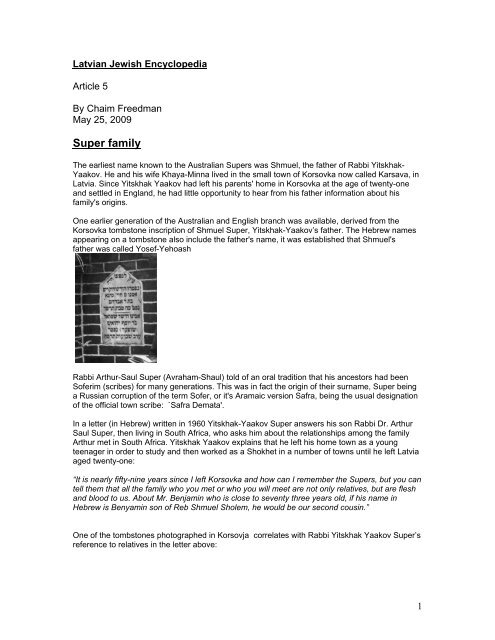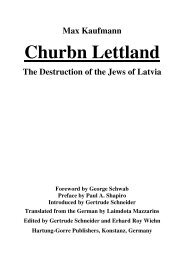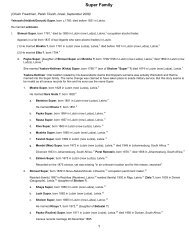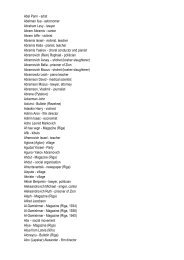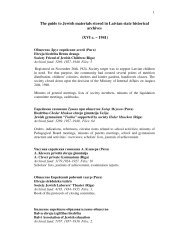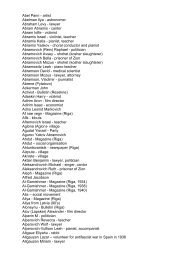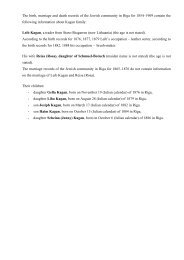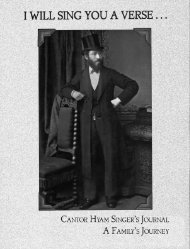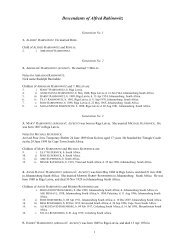Create successful ePaper yourself
Turn your PDF publications into a flip-book with our unique Google optimized e-Paper software.
<strong>Latvian</strong> <strong>Jewish</strong> <strong>Encyclopedia</strong><br />
Article 5<br />
By Chaim Freedman<br />
May 25, 2009<br />
Super family<br />
The earliest name known to the Australian Supers was Shmuel, the father of Rabbi Yitskhak-<br />
Yaakov. He and his wife Khaya-Minna lived in the small town of Korsovka now called Karsava, in<br />
Latvia. Since Yitskhak Yaakov had left his parents' home in Korsovka at the age of twenty-one<br />
and settled in England, he had little opportunity to hear from his father information about his<br />
family's origins.<br />
One earlier generation of the Australian and English branch was available, derived from the<br />
Korsovka tombstone inscription of Shmuel Super, Yitskhak-Yaakov’s father. The Hebrew names<br />
appearing on a tombstone also include the father's name, it was established that Shmuel's<br />
father was called Yosef-Yehoash<br />
Rabbi Arthur-Saul Super (Avraham-Shaul) told of an oral tradition that his ancestors had been<br />
Soferim (scribes) for many generations. This was in fact the origin of their surname, Super being<br />
a Russian corruption of the term Sofer, or it's Aramaic version Safra, being the usual designation<br />
of the official town scribe: `Safra Demata'.<br />
In a letter (in Hebrew) written in 1960 Yitskhak-Yaakov Super answers his son Rabbi Dr. Arthur<br />
Saul Super, then living in South Africa, who asks him about the relationships among the family<br />
Arthur met in South Africa. Yitskhak Yaakov explains that he left his home town as a young<br />
teenager in order to study and then worked as a Shokhet in a number of towns until he left Latvia<br />
aged twenty-one:<br />
“It is nearly fifty-nine years since I left Korsovka and how can I remember the Supers, but you can<br />
tell them that all the family who you met or who you will meet are not only relatives, but are flesh<br />
and blood to us. About Mr. Benjamin who is close to seventy three years old, if his name in<br />
Hebrew is Benyamin son of Reb Shmuel Sholem, he would be our second cousin.”<br />
One of the tombstones photographed in Korsovja correlates with Rabbi Yitskhak Yaakov Super’s<br />
reference to relatives in the letter above:<br />
1
The man Shmuel Sholem<br />
Son of Reb Moshe Simkha Super<br />
Died 10 th Tevet, 5688 [1927]<br />
These names appear in various <strong>Latvian</strong> census records: “Shmuel son of Moshe” Super, born<br />
1846 (lived in Korsovka) appears in a list of people living in 1889 in the rural areas of Lutzin<br />
district. This lists states that Shmuel Moshev (son of Moshe) came from Lutzin to Korsovka in<br />
1877. His father Moshe son of Yitskhak born 1829 in Lutzin, moved to Korsovka in 1876.<br />
Shmuel’s son Benyamin Yitskhak, born 1873, appears in the 1897 census in Korsovka. It appears<br />
that “Mr. Benjamin Super” referred to in Rabbi Super’s letter to his son Arthur, as “Benyamin son<br />
of Shmuel-Sholem” was the son of Shmuel-Sholem whose tombstone appears above. Since<br />
Rabbi Super states that the relationship was of second cousins, it can be established that<br />
Benyamin Super’s grandfather Moshe-Simkha was a brother of Rabbi Yitskhak-Yaakov’s<br />
grandfather Yosef-Yehoash Super. Thus Rabbi Yitskhak-Yaakov’s great-grandfather was<br />
Yitskhak Super, one of the four family heads who lived in Lutzin in the early nineteenth century:<br />
Shmuel, Yitskhak, Kivka and Leib Super. Three of these were found by Feigmanis in Magistrate<br />
records of Lutzin in the year 1837:<br />
“February 3, 1837 citizens of Lutzin who trade in alcoholic drinks deposed the plaint to the city<br />
council of Lyutzin, where they complained of the abuses in taxation of the tax official Glinka.<br />
Among the names of the alcohol tradesmen mentioned were Shmuila Super, Leiba Super and<br />
Itzik Super” 1<br />
When the political changes in the former Soviet Union led to the dissolution of that Union,<br />
archives were opened to the public and much material about <strong>Jewish</strong> families was found. A <strong>Jewish</strong><br />
researcher living in Riga, Aleksanders Feigmanis, found a treasure of documents, in particular the<br />
“Revizsky Skaza” (Revision Lists, meaning census) for the years 1874 and 1897 for the town of<br />
Lutzin and the list from 1897 for Korsovka. Many family groups including several hundred<br />
members of the Super family appeared, allowing the compilation of the family tree.<br />
1<br />
<strong>Latvian</strong> State Historical Archive, Riga. Reference 755-1-370-142. Extracted by Aleksanders<br />
Feigmanis, Riga, Latvia, 1997<br />
2
Here is interred<br />
Our father the ………….<br />
An honourable man<br />
The dear, our teacher and Rabbi<br />
Reb Yaakov Yehoash<br />
Son of Reb Shmuel<br />
Super<br />
A list from 1863 of merchants in the towns of Vitebsk Province includes in Lutzin “Leibe Super”,<br />
without a patronymic.<br />
Yosef-Yehoash’s son “Shmuel Yoselov” (son of Yosef) appears in the 1897 Korsovka census:<br />
3
Feigmanis’ translation of the original Russian census in Korsovka in 1897.<br />
Yitskhak-Yaakov Super does not appear among the children of Shmuel, either because he was<br />
away from home studying, or because he was liable for military service as the second born son.<br />
From the available evidence is seems that Yosef-Yehoash was a son of Yitskhak Super, one of<br />
the three alcohol traders mentioned in the 1837 litigation in Lutzin. My reason is based on the<br />
naming patterns. My wife’s grandfather Rabbi Yitskhak-Yaakov Super was given the name<br />
Yaakov after his maternal great-grandfather Yaakov Dobrin. It seems likely that the name<br />
Yitskhak was given to him after his paternal great-grandfather Yitskhak Super.<br />
Yosef Yehoash has been located in the records of Lutzin<br />
ADD LUDZA BIRTH RECORD OF SON TO YOSEF ITSKOVICH<br />
SUPER<br />
Thus confirming that he was a son of Yitskhak Super.<br />
In 2003 Aleksanders Feigmanis took about three hundred photographs of the now accessible<br />
tombstones in the <strong>Jewish</strong> cemetery of Korsovka. There are large areas covered in weeds that<br />
may hide other family tombstones.<br />
One of the tombstones, that of Yankel Heibish Super, is shown above. The Ohel (mausoleum) of<br />
Shmuel, the son of Yosef-Yehoash Super still stands but the tablet inscribed with the name has<br />
been removed, perhaps by the locals in this village where there are no longer any Jews or<br />
perhaps during the Nazi invasion in 1941 when nearly all the Jews were killed. Fortunately most<br />
of the cemetery survived.<br />
4
Korsovka, 2003 Korsovka, 1929 with Khatzkel Super<br />
Photographed by Feigmanis<br />
A key source for the early nineteenth century relationships of the Supers is the census recorded<br />
in 1816. This is held by the Belarus State Historical Archive in Minsk. This anomaly is due to the<br />
political border changes whereby Lutzin was located in Vitebsk Province under Tsarist<br />
government, which province is now part of Belarus. Therefore some records for Lutzin (now<br />
Ludza) are held in Riga and some in Minsk.<br />
The following are the key entries. See also attached chart and full family tree.<br />
1816 census:<br />
Fond 2640-1-617-55-55<br />
Family number 28.<br />
Shmuel Gevushevich* Super aged 31 in 1811; 35 in 1816.<br />
Shmuel Gevushevich’s sons:<br />
Itsik aged 9 in 1811; 13 in 1816.<br />
Mark aged 2 in 1811; died in 1813.<br />
Leib newborn in 1811; aged 3 in 1816.<br />
Shmuel’s son-in-law Yankel Kufman Sholomovich, absent in 1811, 18 in 1816.<br />
Shmuel Gevushevich’s wife Brokha aged 35 in 1816.<br />
Itsik Shmuelovich’s wife Fruma aged 17 in 1816.<br />
Yankel Kufman’s wife Paika aged 18 in 1816.<br />
*Shmuel’s patronymic Gevushevich is the Russification of the Yiddish name Heibish, equivalent<br />
to the Hebrew name Yehoash.<br />
1834 census<br />
Fond 2640-1-617-155-156<br />
Family number 58<br />
Shmuel Gevushevich Super aged 35 in 1816, 53 in 1834.<br />
From Shmuel Gevushevich’s first wife, sons:<br />
1. Itsik aged 13 in 1816; separated to family number 59 in 1834 list.<br />
2. Mordkha not written in 1816, moved to family number 259 in 1826.<br />
3. Leib aged 4 in 1816; 20 in 1834.<br />
From Shmuel’s second wife [Elka from latter sources sons:<br />
Yankel newborn in 1834; 3 in 1834.<br />
Shmuel’s son-in-law Kifka Sholomovich 18 in 1816, moved to family number 259 in 1824.<br />
Family number 59:<br />
Itsik Shmuelovich Super previously family number 58.<br />
5
Aged 31 in 1834.<br />
Itsik’s son Mordukh newborn in 1816; 14 in 1834.<br />
Itsik’s second son Livsha [should be Moshe] Simkha aged 5 in 1834.<br />
Itsik’s wife Fruma aged 32 in 1834.<br />
Mordukh’s wife Touba aged 16 in 1834.<br />
Since Shmuel’s son Tuviah (Gutta) and Itsik’s son Yosef-Yehoash do not appear in the 1834<br />
census, they must have been born after this date.<br />
From the above it can be seen that the head of the family in 1816 was Shmuel Super, born 1781.<br />
His father’s name was “Gevush” or Heibish/Yehoash, born probably about 1760.<br />
6


